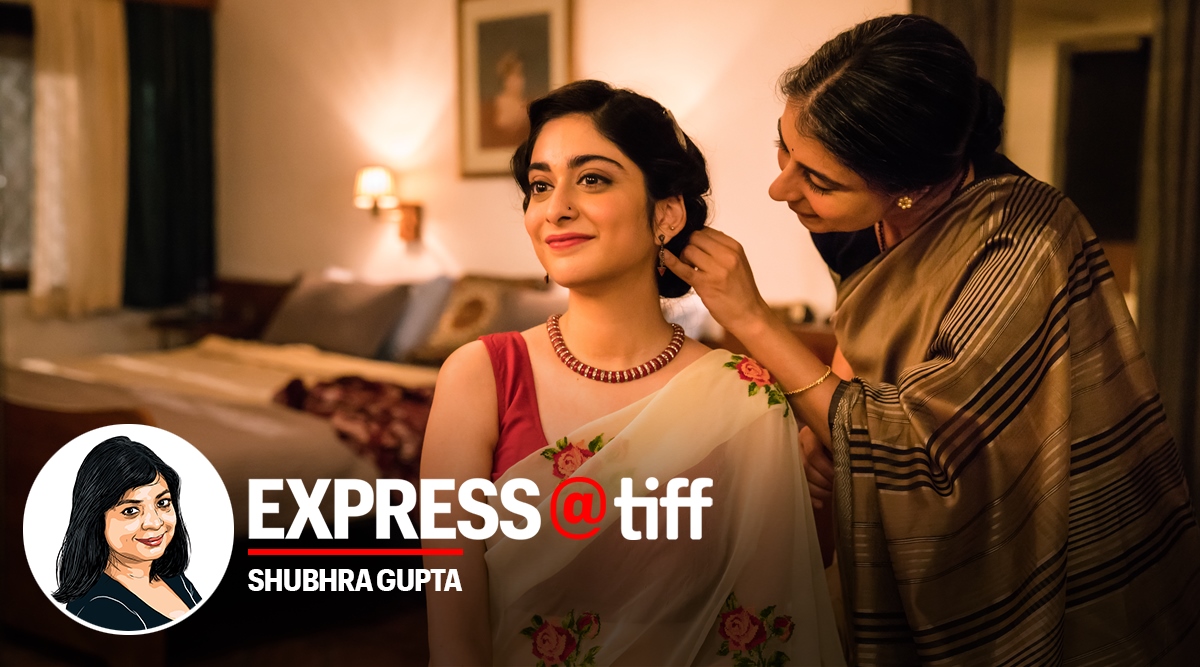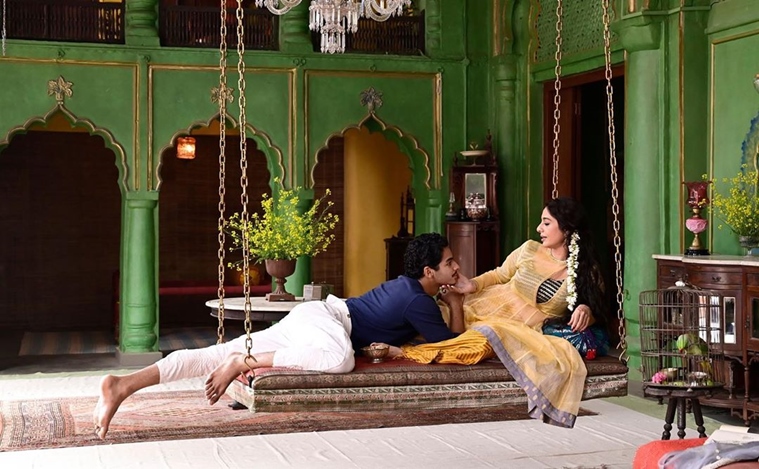
[ad_1]
 The 2020 Toronto International Film Festival ended with the screening of A Suitable Boy.
The 2020 Toronto International Film Festival ended with the screening of A Suitable Boy.
There have been many matrons with only one thing on their mind, the marriage of their daughters to suitable boys. But Mrs Rupa Mehra, she of the tremulous tone but unwavering determination in Vikram Seth’s The Suitable Boy, is truly one of a kind. Not only because Seth’s doorstopper of a novel begins with her famous finger-wagging declaration — you too will marry a boy I choose — to her younger daughter Lata at the elder one’s marriage. But also because it ends with her shooting off a similar exhortation to her younger son regarding marriage and ‘a suitable girl’.
When Seth’s novel came out, 27 years back, it was also truly one of a kind. It was literally, A Big Fat Indian Novel, running around 1500 pages, as it whisked us back to the early 50s, a time when India was grappling with the complexities of a newly formed nation, the wounds of Partition still fresh, experiencing the pushes and pulls of tradition and modernity while gearing up for the first general elections. In Seth’s sprawling, expansive, superbly-crafted work, which melds the political and the personal, we see the emergence of a young independent India, both looking ahead into the future, and struggling to put the past behind. As sparkly-eyed 19-year-old Lata Mehra (Tanya Maniktala) tells college-mate Kabir Durrani (Danesh Razvi), when he asks if he can walk along with her, ‘India is a free country now, I can’t very well stop you’, you understand the significance of those lightly tossed-off words.
That the book would be a film some day was certain. But how would a single film contain the multitudes of Seth’s novel? This six-hour version, adapted by Andrew Davis and directed by Mira Nair, which ended the Toronto International Film Festival (TIFF), is the answer to the question, even though for those who remember the book, it will feel like a rushed affair. So here’s what I, and I’m sure many like me who fell in love the book, had to contend with when we came upon the tele-series: to begin with, the sheer pace of everything is disconcerting. A several page description, for example, of the first encounter of the beauteous Saaeda Bai Firozabadi (Tabu) and young Lothario Maan Kapoor (Ishaan Khatter), is scrunched into a few minutes. The first episode has to bear the brunt of our collective disgruntlement as we try and absorb the speed, Brown characters speaking English, and in the way it seems to be underlining things in order to be understood by people who may not know Indian history. (The BBC One production was shown in weekly instalments last month; it is scheduled to stream on Netflix soon).
It took me till the third episode to begin warming up to it. By this time, we have been introduced, in rapid succession, to all the major characters, the Kapoors, the Mehras, the Khans and the Chatterjis. We know that of Lata’s three suitors, the aforementioned Kabir Durrani, is, gasp, a Muslim, and therefore the most unsuitable, the fate of Amit Chatterji (Mikhail Sen), published-in-England-poet and wannabe dilettante, hangs in balance till the very end, and the very ‘desi’, hard-working, full of confidence shoe-business apprentice Haresh Kapoor (Namit Das) seems to have a head start. Or does he? Seth did keep us guessing, and Lata would have too, if she didn’t have her anxious Ma (Mahira Kakkar) breathing down her pretty, slender neck.
Other dramatis personae crowding the series (be warned, it is crowded and can be confusing, so you have to look sharp) include Lata’s older brother Arun (Vivek Gomber) married to a Calcutta Chatterji, the delightfully flighty, flirty Meenakshi (Shahana Goswami), who is older sister to Amit and Kuku. They are part of Calcutta’s smart set, always extremely chuffed with themselves. In contrast to the sophisticated Chatterjis are the earthy Kapoors, the family Lata’s older sister Savita (Rasika Dugal) is married into. Her husband Pran Kapoor (Gagan Dev Riar) is a professor of English at the Brahmpur University, and the older brother of Maan, both sons of Mahesh Kapoor (Ram Kapoor), Revenue Minister of Poorva Pradesh (standing in for real-life Uttar Pradesh). There’s also the dutiful Mrs Mahesh Kapoor, despairing of Maan, who is irretrievably smitten with Saaeda Bai. Who in turn has, in her entourage, the faithful Bibbo (Sadaf Jafar), a beautiful young sister Tasneem (Joyeeta Das), and her flashing-eyed Urdu tutor Rasheed (Vijay Varma). Then there are the aristocratic Khans, the Nawaab of Baitar (Aamir Bashir), an old friend of Mahesh Kapoor, and his son Firoz (Shubham Saraf), a good friend of Maan’s. Are they just good friends, or more? The relationship between these two young men, both tender and violent, is one of the most affecting parts of the series.
 A Suitable Boy is expected to arrive on Netflix soon.
A Suitable Boy is expected to arrive on Netflix soon.
The book has enough time and more to get into long, languid, eloquent descriptions of locations, characters, situations; in Nair and Davies’ hands, the chop-chop eventually overcomes the choppiness, and becomes its own creature. And once you get past that, all becomes better. It helps enormously that there is the gorgeous Tabu to help things along: her Saaeda Bai is sensuous and alive to the moment, and represents a kind of character who would have been merely a ‘tawaaif’ in a lesser actor’s hands: Saeeda Bai’s ‘nazaaqat’ hides a heart that yearns. Ishaan Khatter grows into his part as he goes along, and when he sighs his love for this ‘fallen’ woman, he makes us believe. Both Ram Kapoor and Aamir Bashir are rock solid. The long line of good actors includes Vinay Pathak, Vijay Raaz, Vijay Varma, with Ranvir Shorey, who turns from eager-to-please lackey to crafty neta, starting off a bit caricaturish (the Raj’s idea of a koi-hai fellow who knows his master’s mind before the master does, and then pulls a fast one over everyone) but settles down. Vivaan Shah, as Lata’s younger brother Varun, wanders about, making us smile; and Gomber has a great moment when he is shown off as an obnoxious show-off. But there are also walk-on parts which feel incomplete: Kulbhushan Kharbana, as Lata’s permanently irate grandpa, is blink-and-miss, as is the wonderful Sheeba Chaddha, as Kabir’s lost mother, and a few others, who had much more to do in the novel.
I also felt cheated on Randeep Hooda’s behalf: for an actor of his caliber, to get such a small part (Billy Irani, Meenakshi’s part-time lover) seems a bit unfair, though he does rise to the occasion every time he shows up. Goswami is a delight, never descending into the lusty gold-digger stereotype, but someone who wants the good life and doesn’t see why she can’t have it. The one principal character who didn’t make me care was Amit (Mikhail Sen), the principal versifier of the Chatterjis, who, according to Seth, are ‘the purveyors of rhymes of surpassing puerility’. Kabir, the history student who plays in the university’s cricket team in fetching flannels, is a dreamboat, and though we would have liked Lata to run away with Kabir, as is originally proposed, it is Namit Das’s Haresh who totally won my heart. He is absolutely terrific.
It took me a while to get used to Lata’s ever-smiling visage. She has the most bewitching smile, but sometimes you feel she should give it a break. Kakkar starts off being a tad too squeaky, and then you develop a fondness for her. Both ladies grew on me. Dugal is spot on, as she always is, as is Sharvari Deshpande as Lata’s best friend Malati, and Mansi Multani as Kalpana Gaur, who discovers a talent for match-making at Mrs Rupa Mehra’s goading. Some of the mise en scenes are spot on too: the Brahmapur University drama society’s rendition of Shakespeare’s Twelfth Night, rehearsed under the baton of the bumptious drama prof, the light-hearted banter between the cast, the spirited cast party, is all a lot of fun.
Nair has always had an eye for getting the setting just right: there’s sheer pleasure to be had in the way the series looks and feels– the houses, the mansions, the large estates, in Calcutta, Kanpur, Brahmpur (looking like a stand-in for Allahabad), the villages and countryside in and around Rudhia, the instant nostalgia-evoking steam-engine trains which criss-cross the series, carrying the characters (‘sootily, fitfully, the train wound its way along the great burning plain of the Ganga’, in Seth’s poetic prose) to where they have to be — the clubby Christmas lunches, the new year revelries, the dance parties, and other assignations.
You are, off and on, struck by a false note or a distinct awkwardness in places in some turns of speech. O revelers, it is Holi in the land of Braj, sings Maan, and you hear, aaj Biraj mein Holi hai rasiya. There are many other instances when in your head, an automatic conversion takes place to the real thing, and when, on occasion the characters break into Hindi or Bangla, they feel grounded. But given that Seth’s characters, from snooty poets to family retainers all speak primarily in English, it is a moot point, and you get used to the tongues.
But what makes you ignore these elements is the way the series draws back to paint a bigger picture, by giving us a simmering hot potato right in the middle of Brahmpur. When the Raja of Marh (Manoj Pahwa bringing to life Seth’s vivid description – ‘ignorant, brutal, slothful and rank’) orders a mandir to be built right next to an old mosque, disquiet turns into a riot, which may not have been exactly state sponsored but is definitely helped along obliquely by the staunchly Hindu home minster Agarwal (Vinay Pathak). People are killed, and Firoz nearly captured by a mob. He is saved that day, but for how long will Muslims continue being safe? Was Seth prescient? The politics of the time, and the fall-out of some crucial events, seems almost like a prophecy of the India we are living in right now, where the polarization between the two communities is at its peak, and a mosque and a mandir are poised in at inflexion point in the nation’s history.
The series may seem a bit too explanatory in some places, but when there is so much fear about looking at the present and the way things are imploding, Nair’s clear-eyed, unambiguous stance in recreating an older India, where things were difficult, but where there was still the possibility of friendship and amity between Hindus and Muslims, makes her Suitable Boy worth your time. At its best, it is both celebratory and elegiac, and reminds us of the times when cynicism hadn’t completely overpowered optimism, a feeling that we can do with in these times.
Express@TIFF | From the cathartic The Ties to the charming Tove | Regina King’s One Night In Miami is a powerful film | Summer of 85 is François Ozon in minor key | Vanessa Kirby is terrific in Pieces Of A Woman | Concrete Cowboy coasts on the real warmth of its characters | From the disturbing New Order to the chilling Violation
And while we are at it, maybe Seth will finish writing his long-awaited sequel. Because really, this is the time for suitable girls. They may just end up saving the universe.
📣 The Indian Express is now on Telegram. Click here to join our channel (@indianexpress) and stay updated with the latest headlines
For all the latest Entertainment News, download Indian Express App.
© IE Online Media Services Pvt Ltd
[ad_2]
Source link